For the fourth year in a row, organ transplants have reached record highs.
In 2016, there were nearly 34,000 transplants — about 20 percent more than in 2012. And 82 percent of those were from people who had died.
But this isn't the major public health victory it seems like it should be.
America's opioid epidemic is one of the major causes for the increase in donor organs — one in every 11 organ donors died of a drug overdose. In some places, that number jumps to nearly one in four.
And unfortunately, there still aren't enough donor organs to meet the demands of people who need transplants.
And since the organs come from overdose victims, they're considered high-risk, meaning they could — but usually don't — carry infectious diseases.
Even with the increase in donor organs, there are almost 120,000 people on the waiting list for organ transplants.



 Trying To Stop The Opioid Epidemic Is An Uphill Battle
Trying To Stop The Opioid Epidemic Is An Uphill Battle






